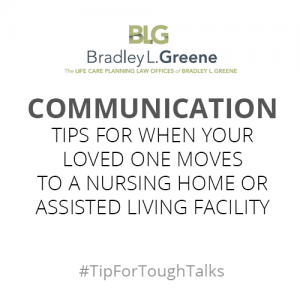Tips for Communicating with Nursing Home and Assisted Living Staff
 Trusting other people with the care of a loved one can be an emotionally difficult journey, and it’s important to feel comfortable addressing any concerns that come up along the way. The following strategies can help you keep the lines of communication open and determine if/when an issue is serious enough for genuine concern.
Trusting other people with the care of a loved one can be an emotionally difficult journey, and it’s important to feel comfortable addressing any concerns that come up along the way. The following strategies can help you keep the lines of communication open and determine if/when an issue is serious enough for genuine concern.EXPECT A PERIOD OF ADJUSTMENT
Minor challenges and misunderstandings are an inevitable part of any residential care setting. Especially during the first few months, as the staff gets to know your loved one and you become familiar with the culture of the community. Whenever possible, we encourage families to visit facilities and consider all of your options long before you need care. Many places have a wait list of a year or more, and you can use this time to touch base regularly with the admissions staff, developing a connection that will make things easier when it’s time to move.
GET SOCIAL
Become an involved part of the community and get to know the staff who are providing care and services. Try to visit at different times of day and check in at the front desk or nursing station each time you visit. Make a point to learn the names and roles of as many care providers as possible, expressing appreciation and personal interest in them. These connections will create a network of people who you can depend on for information, support and assistance as you navigate your loved one’s care needs.
SHOW UP FOR MEETINGS
Plan of Care meetings are typically scheduled at least once every three months to review each resident’s physical, social, emotional, spiritual and dietary needs. A representative from each department will be present to provide updates on care and adjust their plans as needed, with your input. Some families find it helpful to keep notes between meetings about any minor issues or concerns and then talk about everything at this time. Even if it seems that nothing has changed since the last meeting, this is still an important time to connect with staff and strengthen your partnership.
GO TO THE SOURCE
Whenever possible, unless there is an issue of safety, try to ask questions and address minor concerns with the person who is directly involved in that aspect of care. For example, instead of going to the nursing supervisor when you’re unhappy with how your loved one is dressed or the upkeep of her clothing – ask the nursing assistant or laundry aide what they recommend to help keep clothing more organized and see if they can suggest anything to resolve the issue.
KNOW WHEN TO ESCALATE A CONCERN
Naturally, we all wish that everyone would provide our loved ones with the same level of care attention we would give them at home. While this may not always be possible, most issues can be easily resolved with a direct conversation and a collaborative spirit. It is reasonable to expect that your loved is treated with dignity and respect, while being kept safe at all times.
Any time a resident’s safety is at risk – the appropriate response is to bring the issue to the attention of the Administrator and/or Director of Nursing immediately. These concerns must always be taken seriously, and if you do not feel confident about how an issue is resolved, there are methods in place to help advocate for your loved one. Phone numbers for the Long Term Care Ombudsman and the Department of Health should be readily accessible in all facilities. You can also contact our experienced Care Coordinators to help you assess the situation, ensure your loved one’s safety and determine if/when additional action is appropriate.
WRITE IT DOWN
Whenever possible, keep a record of any significant events, questions or concerns regarding your family member. This could be as simple as putting a quick note on your calendar, but we suggest keeping a notebook or folder dedicated specifically to your loved one’s care. One way this can be helpful is to offer perspective on situations – while it may seem like your parent is losing a lot of weight, maybe the notes will indicate it hasn’t been as much as you thought. Or if any concerns do need addressed with facility staff, your records can
provide valuable information to substantiate your concerns.
KEEPING PERSPECTIVE
Thankfully, most people who care for the elderly are genuinely kind and have good intentions for the services they provide. And most problems can be resolved with a little patience, flexibility and honest dialogue. Developing a trusting relationship with caregivers can take time, but is always worth the effort. We hope the strategies above are helpful as you navigate all the decisions and conversations that are ahead for your family.
At the Life Care Planning and Elder Law office of Bradley L. Greene, Esq., our clients’ quality of life is our first priority, and we strive to ensure safety and peace of mind for both you and your loved ones. Please don’t hesitate to reach out if you need assistance in any way. We have experienced many of these caregiving obstacles firsthand, which underscores our commitment to helping support other families through every stage of the process.
Bradley L. Greene, Esq. is a Life Care Planning and Elder Law firm located in Beachwood, OH specializing in Estate Planning, Medicaid Planning and Elder Abuse – offering personalized support and family guidance through all of life’s transitions.

